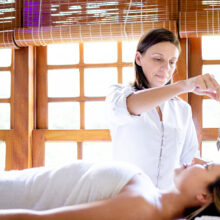The Truth About Melatonin
- Published: Tuesday, March 1st 2011
- in Mindset
In recent years melatonin has gained popularity as a natural alternative to prescription sleep aids. However, for all of its popularity, it seems that many people haven’t educated themselves completely about its uses, benefits and side effects. So, what is melatonin?
Melatonin isn’t a natural herb or vitamin; it is a hormone already produced by your body’s pineal gland that works to send signals to the brain in order to regulate the sleep-wake cycle. Contrary to what some might believe, that is all it does; melatonin does not initiate sleep. Whether produced naturally by our bodies, or ingested as a supplement it simply works with your body’s programing by telling the brain when it’s time to sleep.
How it Works
Melatonin works with light to communicate the sleep impulse to your body. Produced in the dark and inhibited by light, melatonin production is at its peak in the middle of the night, dropping off slowly as the sun rises. When you ingest melatonin it works a little differently, since it doesn’t have the same slow build and reduction as your body’s natural production cycle.
Correct Dosage is Key
Since ingesting melatonin delivers it in bursts, dosage is a very important factor. Oftentimes over-the-counter melatonin supplements found in your local health food store’s vitamin isle are sold in doses sometimes as high as three to 10 times the recommended amount. And unlike prescription sleep drugs, increasing the dosage won’t deepen your sleep, but it can increase the risk of side effects like headaches, nausea, grogginess, and hormone fluctuation. In Europe, high doses of melatonin are used as contraceptive, which further exemplifies that this is a serious hormone, not to be self-prescribed casually and definitely not to children.
But under the guidance of a professional and when following the recommended dosage, this sleep regulating hormone can be helpful for those with jetlag or temporary insomnia caused by anxiety or depression.
Get Melatonin Naturally
Natural melatonin is produced by tart cherries, and according to Dr. Michael J. Breus, sleep expert and clinical psychologist, drinking tart cherry juice can help with insomnia (the combination of vitamin D and B, folic acid, and calcium help with both energy and relaxation).
Ultimately, melatonin shouldn’t be considered a miracle hormone that will put you into a sound slumber, but rather a natural boost to help your sleep patterns stay regulated on occasions when sleep doesn’t come so easy. For more information take a look at this video featuring Dr. Breus and nutritionist Keri Glassman featured on NBC news.
View more videos at: http://www.nbcnewyork.com.
via: Huffington Post


